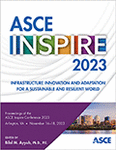Risk Assessment for Infrastructure Vulnerable to Flood Hazards in the Great Lake Region
Publication: ASCE Inspire 2023
ABSTRACT
Ensuring the security of coastal infrastructure and users’ safety in the Great Lakes region is crucial to maintaining sustainability and resilience against frequently occurring inclement climates. To assess the risk of flood hazards for certain types of infrastructure, we have developed risk assessment models based on machine learning to generate predictions of risk scores. The risk score is based on multiple components, such as exposure, vulnerability, criticality, and sensitivity to flood hazards. The dataset is from the Southeast Michigan Council of Governments (SEMCOG). Gaussian process regression (GPR) and support vector machine (SVM) are applied to train (75%) and test (25%) data, respectively. We find the model predictions are accurate compared to the original data points, and the GPR model exhibited better performance than the SVM model. The risk assessment model can be helpful to identify the degree to which infrastructure assets are at risk and provide recommendations for decision-makers on minimizing the effects of future hazardous flood events.
Get full access to this article
View all available purchase options and get full access to this chapter.
REFERENCES
Chen, Y., Xie, Y., Ge, X., Zhou, Y., Zhang, D., Jing, Y., Wu, J., and Qiu, A. (2021). Vulnerability Assessment of Equipment Excited by Disturbances Based on Support Vector Machine and Gaussian Process Regression. IEEE Transactions on Electromagnetic Compatibility, 63(1), 103–110. https://doi.org/10.1109/TEMC.2020.3037110.
Donnelly, J., Abolfathi, S., Pearson, J., Chatrabgoun, O., and Daneshkhah, A. (2022). Gaussian process emulation of spatio-temporal outputs of a 2D inland flood model. Water Research, 225, 119100. https://doi.org/10.1016/j.watres.2022.119100.
Fathipour-Azar, H. (2022). Machine learning-assisted distinct element model calibration: ANFIS, SVM, GPR, and MARS approaches. Acta Geotechnica, 17(4), 1207–1217. https://doi.org/10.1007/s11440-021-01303-9.
Jonkman, S. N., van Gelder, P. H. A. J. M., and Vrijling, J. K. (2003). An overview of quantitative risk measures for loss of life and economic damage. Journal of Hazardous Materials, 99(1), 1–30. https://doi.org/10.1016/S0304-3894(02)00283-2.
Khan, T. A., Shahid, Z., Alam, M., Su’ud, M. M., and Kadir, K. (2019). Early Flood Risk Assessment using Machine Learning: A Comparative study of SVM, Q-SVM, K-NN and LDA. 2019 13th International Conference on Mathematics, Actuarial Science, Computer Science and Statistics (MACS), 1–7. https://doi.org/10.1109/MACS48846.2019.9024796.
Lau, C. K., Lai, K. K., Lee, Y. P., and Du, J. (2015). Fire risk assessment with scoring system, using the support vector machine approach. Fire Safety Journal, 78, 188–195. https://doi.org/10.1016/j.firesaf.2015.10.003.
Manan, A., Kamal, K., Ratlamwala, T. A. H., Sheikh, M. F., Abro, A. G., andZafar, T. (2021). Failure classification in natural gas pipe-lines using artificial intelligence: A case study. Energy Reports, 7, 7640–7647. https://doi.org/10.1016/j.egyr.2021.10.093.
Maritz, J., Lubbe, F., and Lagrange, L. (2018). A Practical Guide to Gaussian Process Regression for Energy Measurement and Verification within the Bayesian Framework. Energies, 11(4), 935. https://doi.org/10.3390/en11040935.
McFarland, J. M. (2008). Uncertainty analysis for computer simulations through validation and calibration. https://ir.vanderbilt.edu/handle/1803/11577.
NOAA NCEI (NOAA National Centers for Environmental Information). (2023). Billion-Dollar Weather and Climate Disasters. https://doi.org/10.25921/stkw-7w73.
Pal, M., and Deswal, S. (2010). Modelling pile capacity using Gaussian process regression. Computers and Geotechnics, 37(7–8), 942–947. https://doi.org/10.1016/j.compgeo.2010.07.012.
Pan, Y., Zhang, L., Wu, X., and Skibniewski, M. J. (2020). Multi-classifier information fusion in risk analysis. Information Fusion, 60, 121–136. https://doi.org/10.1016/j.inffus.2020.02.003.
Pickard, A., and Barlock, R. (2022). Partnering for Resilience: The Southeast Michigan Flooding Risk Tool. United States Department of Transportation. https://highways.dot.gov/public-roads/spring-2022/02.
Information & Authors
Information
Published In
History
Published online: Nov 14, 2023
ASCE Technical Topics:
- Artificial intelligence and machine learning
- Bodies of water (by type)
- Computer programming
- Computing in civil engineering
- Disaster risk management
- Disasters and hazards
- Engineering fundamentals
- Floods
- Infrastructure
- Infrastructure resilience
- Infrastructure vulnerability
- Lakes
- Model accuracy
- Models (by type)
- Natural disasters
- Risk management
- Water and water resources
- Water management
Authors
Metrics & Citations
Metrics
Citations
Download citation
If you have the appropriate software installed, you can download article citation data to the citation manager of your choice. Simply select your manager software from the list below and click Download.
